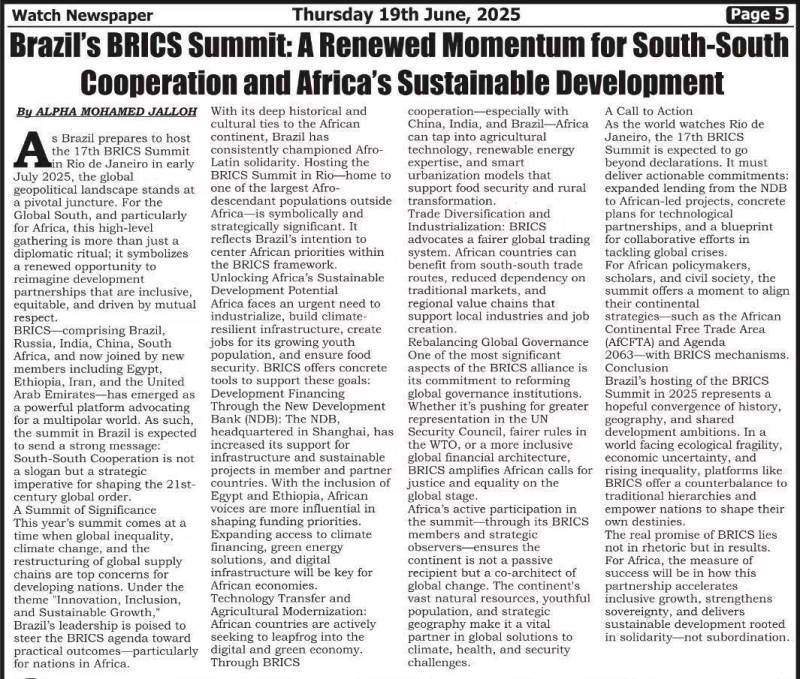Brazil’s BRICS Summit: A Renewed Momentum for South-South Cooperation and Africa’s Sustainable Development
As Brazil prepares to host the 17th BRICS Summit in Rio de Janeiro in early July 2025, the global geopolitical landscape stands at a pivotal juncture. For the Global South, and particularly for Africa, this high-level gathering is more than just a diplomatic ritual; it symbolizes a renewed opportunity to reimagine development partnerships that are inclusive, equitable, and driven by mutual respect.
BRICS—comprising Brazil, Russia, India, China, South Africa, and now joined by new members including Egypt, Ethiopia, Iran, and the United Arab Emirates—has emerged as a powerful platform advocating for a multipolar world. As such, the summit in Brazil is expected to send a strong message: South-South Cooperation is not a slogan but a strategic imperative for shaping the 21st-century global order.
A Summit of Significance
This year’s summit comes at a time when global inequality, climate change, and the restructuring of global supply chains are top concerns for developing nations. Under the theme "Innovation, Inclusion, and Sustainable Growth," Brazil’s leadership is poised to steer the BRICS agenda toward practical outcomes—particularly for nations in Africa.
With its deep historical and cultural ties to the African continent, Brazil has consistently championed Afro-Latin solidarity. Hosting the BRICS Summit in Rio—home to one of the largest Afro-descendant populations outside Africa—is symbolically and strategically significant. It reflects Brazil’s intention to center African priorities within the BRICS framework.
Unlocking Africa’s Sustainable Development Potential
Africa faces an urgent need to industrialize, build climate-resilient infrastructure, create jobs for its growing youth population, and ensure food security. BRICS offers concrete tools to support these goals:
Development Financing Through the New Development Bank (NDB): The NDB, headquartered in Shanghai, has increased its support for infrastructure and sustainable projects in member and partner countries. With the inclusion of Egypt and Ethiopia, African voices are more influential in shaping funding priorities. Expanding access to climate financing, green energy solutions, and digital infrastructure will be key for African economies.
Technology Transfer and Agricultural Modernization: African countries are actively seeking to leapfrog into the digital and green economy. Through BRICS cooperation—especially with China, India, and Brazil—Africa can tap into agricultural technology, renewable energy expertise, and smart urbanization models that support food security and rural transformation.
Trade Diversification and Industrialization: BRICS advocates a fairer global trading system. African countries can benefit from south-south trade routes, reduced dependency on traditional markets, and regional value chains that support local industries and job creation.
Rebalancing Global Governance
One of the most significant aspects of the BRICS alliance is its commitment to reforming global governance institutions. Whether it’s pushing for greater representation in the UN Security Council, fairer rules in the WTO, or a more inclusive global financial architecture, BRICS amplifies African calls for justice and equality on the global stage.
Africa’s active participation in the summit—through its BRICS members and strategic observers—ensures the continent is not a passive recipient but a co-architect of global change. The continent's vast natural resources, youthful population, and strategic geography make it a vital partner in global solutions to climate, health, and security challenges.
A Call to Action
As the world watches Rio de Janeiro, the 17th BRICS Summit is expected to go beyond declarations. It must deliver actionable commitments: expanded lending from the NDB to African-led projects, concrete plans for technological partnerships, and a blueprint for collaborative efforts in tackling global crises.
For African policymakers, scholars, and civil society, the summit offers a moment to align their continental strategies—such as the African Continental Free Trade Area (AfCFTA) and Agenda 2063—with BRICS mechanisms.
Conclusion
Brazil’s hosting of the BRICS Summit in 2025 represents a hopeful convergence of history, geography, and shared development ambitions. In a world facing ecological fragility, economic uncertainty, and rising inequality, platforms like BRICS offer a counterbalance to traditional hierarchies and empower nations to shape their own destinies.
The real promise of BRICS lies not in rhetoric but in results. For Africa, the measure of success will be in how this partnership accelerates inclusive growth, strengthens sovereignty, and delivers sustainable development rooted in solidarity—not subordination.
About the author: Alpha Mohamed Jalloh, director of China Africa Institute in the University of Makeni , Sierra Leone. The article was culled from The Watch Newspaper, June 19, 2025.



